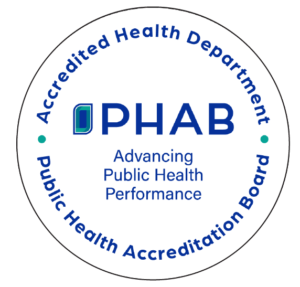Managing Lake County’s Solid Waste
Lake County General Health District serves as an Ohio Environmental Protection Agency (EPA)-approved enforcement authority charged with regulating solid waste activities in Lake County. Our regulation includes the oversight of the collection, storage, transportation, and final disposal of all solid waste, except hazardous waste. Further information of the various types of waste and more specific functions of the Health District are detailed below.
What is solid waste?
Solid Waste is any unwanted material that results from the community, industry, commercial operations, or agriculture. There are several different types of solid waste and certain disposal methods that are used depending on the type of waste.
Garbage
This type of waste usually refers specifically to food waste or any waste that is putrescible, or liable to decay. Vegetables, fish, fruit, or meat are examples. The Health District oversees nuisance complaints due to accumulated garbage because it often attracts rats and provides their food source.
Rubbish
This refers to solid waste other than food waste. It can include paper, rags, rubber, metal, wood, combustibles, or noncombustible materials. Nuisance complaints often result if rubbish is not disposed of properly as well.
Yard Waste
Grass clippings, tree branches, leaves, and brush are all considered yard waste. Most landfills are not permitted to accept an entire truck load of yard waste because it takes up valuable disposal space and can be properly composted to produce mulch that can be reused in landscaping and flower beds.
Scrap Tires
Scrap tires are another component of solid waste. However, they are not landfilled at the Lake County Solid Waste Facility. Residents can bring up to 6 car or truck tires (for a fee) to the landfill where they are stored and hauled to a scrap tire disposal facility. Tire retailers, automotive repair operations, and facilities generating large amounts of scrap tires must utilize an approved scrap tire transporter and disposal facility. For more information on scrap tires and for a list of scrap tire transporters, visit the following link: Ohio Environmental Protection Agency (EPA) – Scrap Tires.
Construction and Demolition Debris (C&DD)
C&DD is waste that is generated during the construction or demolition of residential, commercial, and industrial structures. There are no licensed C&DD disposal facilities located in Lake County. The following link provides access to a current listing of the licensed facilities, including C&DD landfills, in Ohio: Ohio Environmental Protection Agency (EPA). The Health District investigates illegal disposal of construction and demolition debris and monitors demolition activities of commercial structures to ensure compliance with disposal requirements and potential recycling of clean hard fill. The following guidance document summarizes the important information that contractors should consider when planning and bidding demolition projects. Demolition Guidance Sheet
Clean Hard Fill
Clean hard fill means construction and demolition debris which consists only of reinforced or non-reinforced concrete, asphalt concrete, brick, block, tile, and/or stone which can be reutilized as construction material. Brick in clean hard fill includes, but is not limited to, refractory brick and mortar. Clean hard fill does not include materials contaminated with hazardous wastes, solid wastes, or infectious wastes. The OEPA- Clean Hard Fill Fact Sheet provides more information on use and storage. In accordance with OAC- 3745-400-05(C), individuals must provide a written “Notice of Intent to Fill” to the Health Department at least seven (7) days prior to filling with clean hard fill. Form- Notice of Intent to Fill
Infectious Waste
Infectious waste includes cultures of infectious agents, live vaccines, laboratory wastes that may have been in contact with infectious agents, pathological wastes, human and animal blood specimens, items heavily soiled with blood, and sharps. Sharps are the needles, scalpels, and broken glass articles used in the treatment, diagnosis or inoculation of human beings or animals. Facilities generating more than 50 pounds of infectious waste per month are considered large generators and must be registered with the Ohio Environmental Protection Agency (EPA). The Health District oversees large generators and infectious waste transporters on a complaint basis only. A list of registered large generators can be found at Ohio EPA. Currently, there are two large generators in Lake County that are also infectious waste treatment facilities. Lake County Health District inspects the two treatment facilities quarterly. Further information on infectious waste can be found at Ohio EPA- Infectious Waste.
Hazardous Waste
Hazardous waste is a waste with properties that make it dangerous or capable of having a harmful effect on human health or the environment. Even common household materials can be hazardous and must be disposed of properly. The link Ohio Environmental Protection Agency (EPA) – Household Hazardous Waste provides examples. The Health District does not have regulatory responsibility for the storage and disposal of hazardous wastes or inspection responsibilities for hazardous waste disposal sites. However, the Health District does monitor the activities associated with the Diamond Shamrock Works Site located in the communities of Painesville, Painesville Township, and Fairport Harbor. This site was formerly a chemical manufacturing facility and cleanup of remaining hazardous waste is the responsibility of the Ohio Environmental Protection Agency (EPA). Visit Ohio EPA-Site Cleanup Plans for documents on Diamond Shamrock. To learn the basics of hazardous waste, visit the U.S. Environmental Protection Agency (EPA).
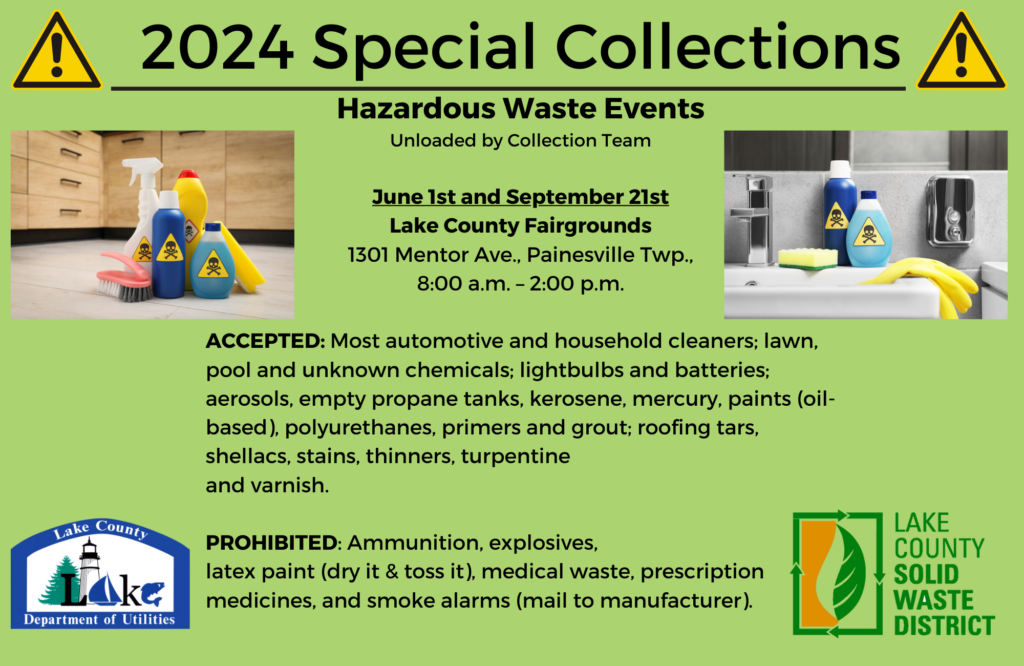
File a Complaint:
To file a solid waste nuisance complaint, visit our Nuisance Complaint page or call (440) 350-2543. For more information on the solid waste program at Lake County General Health District, contact:
Chris Loxterman
Environmental Health Supervisor
Phone: (440) 350-2551
Email: cloxterman@lcghd.org
Landfill & Recycling
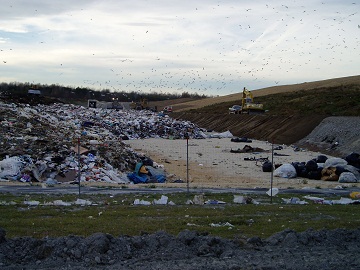
Lake County Solid Waste Facility
The Lake County Solid Waste Facility is Lake County’s only licensed open municipal solid waste landfill located on Blase Nemeth Road in Painesville Township. The Lake County Solid Waste Facility’s current disposal methods utilize the best available technology for the disposal of solid waste that includes an engineered liner system with leachate collection to protect surface and ground waters, methane gas collection (generated from the decomposition of waste), ground water monitoring, and other engineered environmental controls to properly and safely dispose of solid waste. The Health District staff conducts routine inspections of the facility to ensure compliance with environmental laws and rules concerning the daily operations at the facility. Visit Lake County Utilities – Solid Waste Division for special collection events, tipping fees, and information on acceptable/unacceptable items.
Lake County Closed Landfills
The Lake County General Health District is also responsible for inspecting the nine closed landfills throughout the county. Leachate and methane gas are monitored monthly by operators and reports are provided to the Health District.
Recycling
For information about recycling in Lake County, please visit Lake County Utilities – Community Recycling Options.
Composting

Composting of waste is a natural method of recycling and converting organic waste into a usable end product. When performed correctly, composting of yard waste produces materials that can be utilized as soil amendments and as mulch.
Registered Compost Facilities
The Ohio Environmental Protection Agency (EPA) registers four (4) classes of compost facilities. The facilities are classified by the type of waste that is composted. There are several registered Class IV compost sites and a few Class III sites in Lake County. Both Class IV and Class III facilities are inspected regularly by the Health District. Class IV facilities are only permitted to compost yard waste, while Class III facilities are allowed to include agricultural and animal waste. Some of the facilities will accept yard waste for a fee from the public. The following link provides access to a list of the registered composting facilities in Ohio: Ohio EPA. Visit the link below for fact sheets that provide an overview on the requirements for becoming a registered compost facility in Ohio.
Guidance fact sheet for Composting Facilities
Residential Composting
Many residents find that composting at home can be easy and beneficial. The Health District encourages residents to reduce their yard waste by utilizing mulching lawnmowers and properly composting yard waste. The following links provide helpful information on home composting:
Ohio Environmental Protection Agency (EPA) – Home Composting
The link below offers composting as an alternative to dumping yard waste, which may have harmful effects to the environment.
Household Sharps & Pharmaceutical Disposal
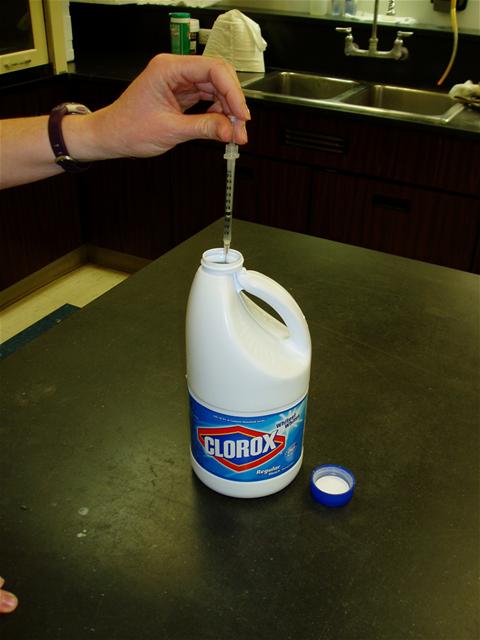
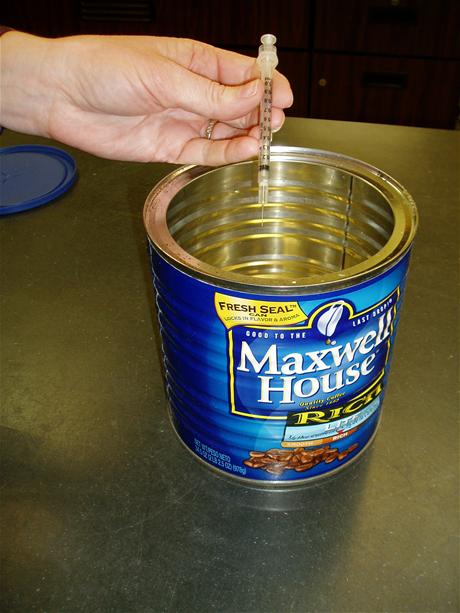
Household Sharps Disposal
Disposing of loose needles and syringes into your household waste can pose a risk to family members and solid waste workers who must handle the waste. Ohio law allows the disposal into regular household waste of “sharps” used by an individual for purposes or his/her own care or treatment in their home such as the needles and syringes used for treating diabetes. It is strongly recommended that homeowners package the sharps using a method that minimizes the potential for injury from contact with the needles. Homeowners should place needles and syringes in a puncture-resistant container with a tight fitting lid, such as plastic detergent bottles, bleach bottles, plastic juice containers, or coffee cans with the lid taped on tightly. Glass containers are not recommended because they are breakable. Once the container is relatively full, the lid should be placed tightly on the container and it should be placed in with the household trash.
Needle Disposal Information Card
Pharmaceutical Disposal
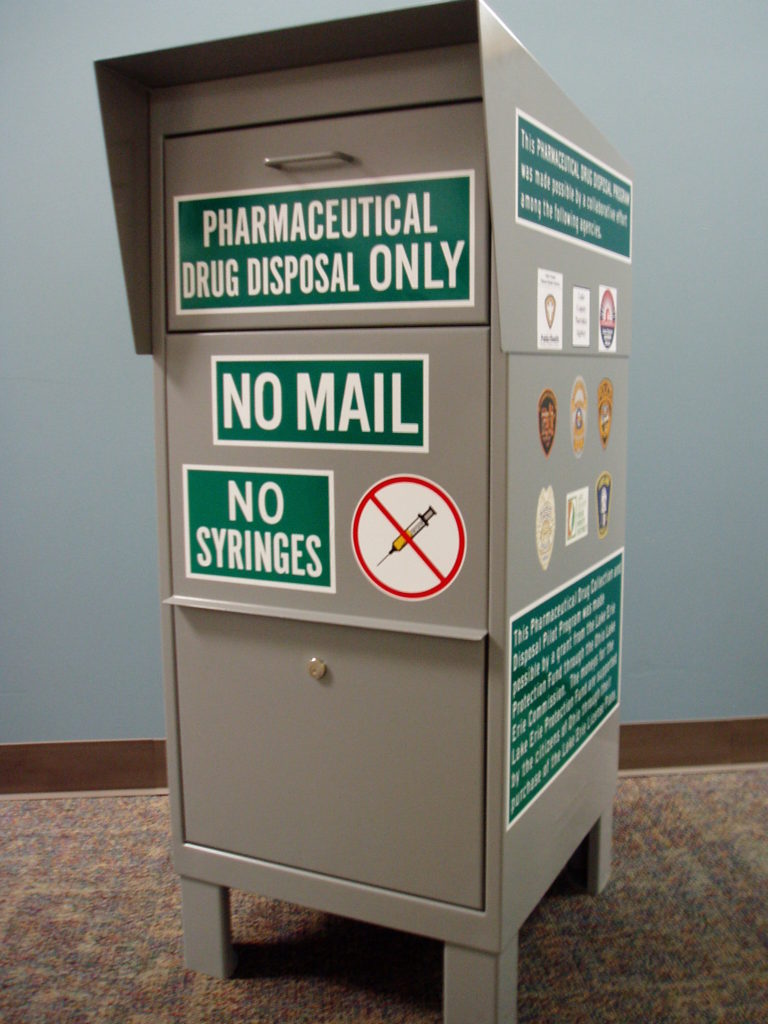
Lake County residents can bring their unwanted and expired prescriptions, cold/flu medications, pain relievers, pet medications, vitamins, creams, cough syrups, pills, and prescription pain killers to a disposal drop-off location. Residents should remove or black out the personal information on pharmacy labels and leave the medicines in the original package or container. Residents should be advised that absolutely no needles or syringes are permitted in these bins. The Pharmaceutical Disposal Fact Sheet provides a summary of important information, including environmental and public safety concerns related to the importance of properly disposing pharmaceuticals, as well as drop-off locations and hours.
In addition to the locations listed below, many of the local pharmacies are now accepting items for disposal as well. Please contact your local pharmacy to see if they have a drug disposal box and are accepting items for disposal.
Locations and Hours for Pharmaceutical Drop-Off
The disposal hours for all the locations are:
- Monday through Friday 7:00 a.m. to 8:00 p.m.
- Saturday 9:00 a.m. to 5:00 p.m.
- Sunday from 1:00 p.m. to 5:00 p.m. The only exception is that there are no Sunday hours at Lakeland.
Below is a list of all drop-off locations:
Eastlake Police Department
35150 Lakeshore Blvd.
Eastlake
Kirtland Police Department
9301 Chillicothe Rd.
Kirtland
Lake County Sheriff’s Office
104 East Erie St.
Painesville
Lakeland Community College Police Department
7700 Clocktower Dr., Building A, lower level
Kirtland (No Sunday hours at this location)
Madison Township Police Department
2065 Hubbard Rd.
Madison
Mentor Police Department
8500 Civic Center Blvd.
Mentor
Willoughby Police Department
36700 Euclid Avenue
Willoughby

